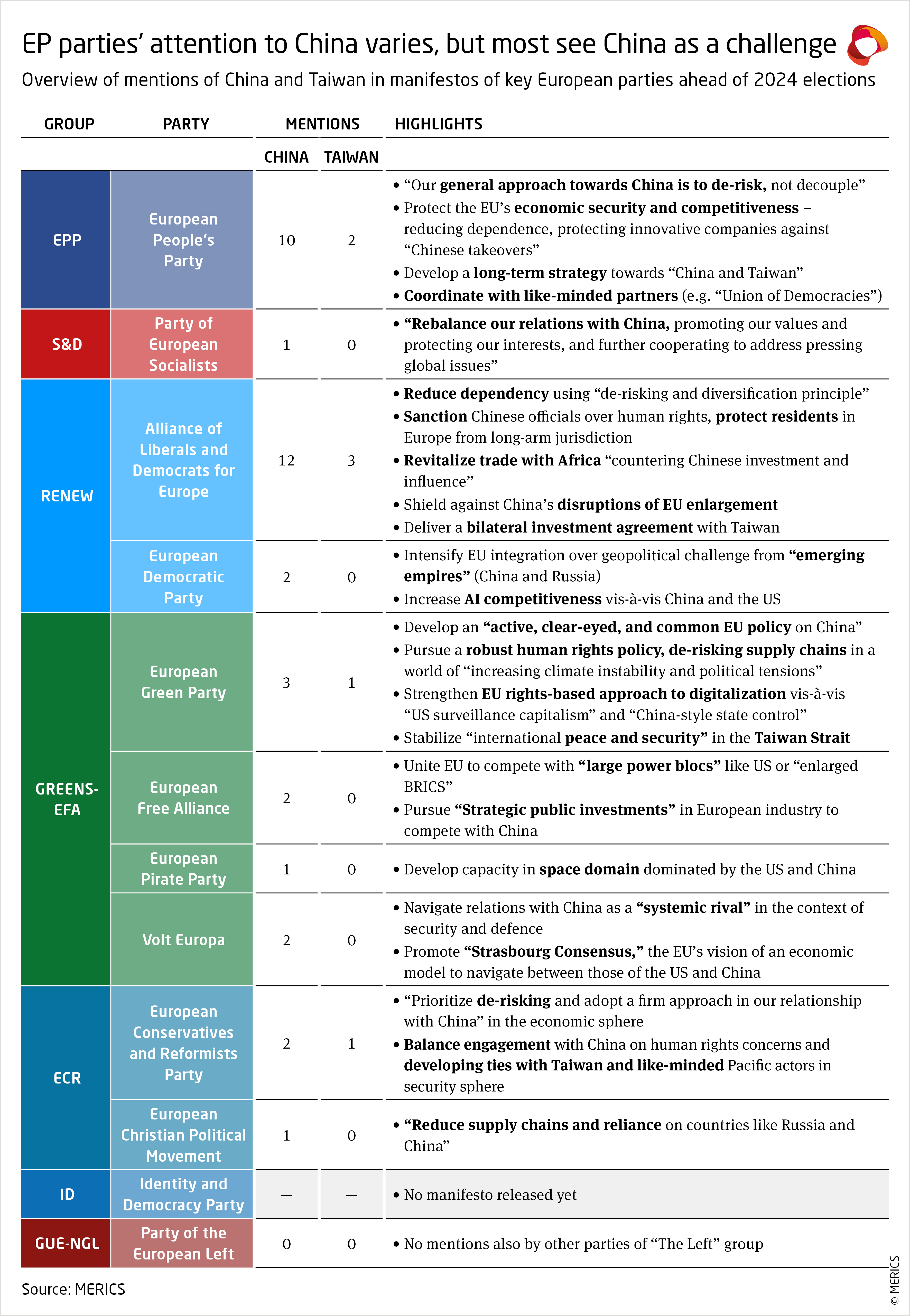

How EP parties see China + EV exports + Trade and Technology Council
In this issue of MERICS Europe China 360°, we cover the following topics:
- European Parliament elections: How do EP parties see China?
- MERICS data highlight: EV exports
- Trade and Technology Council’s cooperation on China falls short of hard expectations, but delivers soft coordination
By Grzegorz Stec
The upcoming June European Parliament (EP) elections will shape the political context of EU-China relations for the next five years. The current term-ending mandate has been dominated by building the policy tools and political narrative of a de-risking approach towards China, and the election results will influence Brussels' dedication to this agenda.
While the parties in the European Parliament differ in the level of attention they give to China, there's a general consensus among the major parties: China is increasingly viewed primarily as a challenge. However, the impact of the elections should not be underestimated, as it will define whether the impetus behind de-risking will continue as we see its tools come in to use.
The EP plays a considerable role in shaping the EU's China policy as, among others, it:
- approves the final composition of the incoming European Commission and its political party groups participate in negotiating the priorities of the next EU mandate, which will shape the practice of the de-risking agenda.
- participates in legislative processes, including trilogue negotiations with other institutions, shaping the EU’s policy toolbox towards China.
- approves the EU's budget and trade and investment agreements, crucial for implementing projects like the Global Gateway and pursuing diversification.
- generates political momentum through committee work, resolutions and MEP delegations, as seen in the context of sustainability instruments, visits to Taiwan, or grilling EU officials on China affairs.
In terms of direct influence on EU-China relations, the EP's political impact is more substantial than on the bloc’s relations with other countries. Beijing reacts more often to political statements and resolutions from the EP than other states do, often to the detriment of EU-China relations. This was made most evident in China’s response to the EU’s deployment of the human rights sanctions regime in 2021 where Beijing reacted with sanctions targeting five MEPs and the EP’s subcommittee on Human Rights, effectively quenching prospects of ratifying the Comprehensive Agreement on Investment (CAI).
The manifestos demonstrate EP parties’ varied degree of interest in China or willingness to put it among their policy priorities. European People's Party (EPP) and Alliance of Liberals and Democrats for Europe (ALDE) stand out as parties with the most robust and defined perspectives on China. As a matter of fact, they are the only ones with dedicated China strategy papers, released in 2021 and 2023 respectively.

EPP’s manifesto distinguishes itself by explicitly endorsing de-risking as the cornerstone of EU China policy and emphasizing economic security and competitiveness issues. This shouldn’t come as a surprise given that it’s key proponent, Ursula von der Leyen, is the EPP’s lead candidate for another term as Commission President. Overall, the party seems open to making responses to China-related economic and geopolitical challenges a fundamental aspect of its vision for long-term strategy for the EU.
ALDE – part of the Renew EP grouping – compared to other parties, highlights more human-rights related concerns also in the context of China’s long-arm jurisdiction towards residents in Europe. In its mentions of Taiwan, the party also goes beyond calling for maintaining stability in the Strait and voices support for Taiwan’s “right to determine its own future” and negotiating a bilateral investment agreement with Taipei.
The European Green Party (EGP) provides a concise and direct statement of interests regarding China, advocating for an “active, clear-eyed, and common” EU China policy. Beyond stability in the Taiwan Strait, the party highlights the tensions and, at times, conflicting EU interests towards China. These range from the need for a “robust human rights policy” to decreasing EU dependence on China, while acknowledging the need to navigate increased climate and political instabilities, and importance of interdependence as "a key factor for a peaceful international system and a global just transition.”

